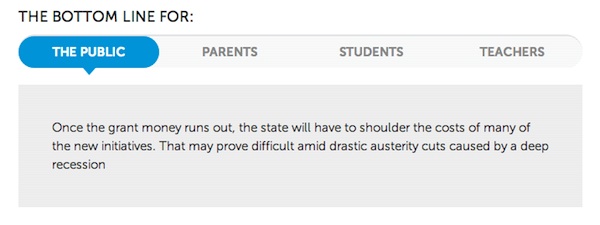Nieman Journalism Lab |
- The Boston Globe nicks a page from the OC Register playbook and pushes subscribing as a civic good
- Branch and Potluck sold to Facebook for $15M
- Start small, plan big: How two nonprofit education sites came together to build a network
| The Boston Globe nicks a page from the OC Register playbook and pushes subscribing as a civic good Posted: 13 Jan 2014 09:19 AM PST If you’re looking for against-the-grain experiments at newspapers, Aaron Kushner’s Orange County Register is probably the best place to find them these days. One of those experiments, which our Ken Doctor wrote about a year ago, attempts to tie being a Register subscriber to being a good member of your community. As Ken wrote:
Whatever you think of Kushner’s other ideas — and some seem worth questioning — this one seems golden. You get proud subscribers and civic engagement at the cost of a commodity product that costs you either marginal newsprint prices or nothing at all. It’s such a good idea that The Boston Globe has run with it:
Not sure why Boston only gets silver envelopes while the OC gets gold — but metallic aesthetic quibbles aside, this is the sort of low-cost, high-benefit program a lot of other newspapers should be emulating to strengthen ties with its core readership. |
| Branch and Potluck sold to Facebook for $15M Posted: 13 Jan 2014 08:22 AM PST Peter Kafka at Recode (née AllThingsD) has the details, and Branch founder Josh Miller has the Facebook post (natch) to announce it.
Jay Rosen has a take: (While Miller says Branch and Potluck “will live on outside of Facebook,” this sort of acquisition often ends with a quiet shutdown six months later. This smells a lot like an acquihire.) Personally, I always liked the ideas behind Branch — structured conversations that are both open and curated, where discussion is as much a first-class citizen as content. When Branches went well, they could be great. But it never got anything close to the traction a community-based site would need. (Potluck didn’t interest me as much, beyond its status as another attempt to figure out the right UX for news on phones.) Here’s our 2012 Q&A with Miller about Branch and our story on the Potluck pivot in November. |
| Start small, plan big: How two nonprofit education sites came together to build a network Posted: 13 Jan 2014 08:05 AM PST What started out as two independent nonprofit news sites is now a network of four — with aims to grow larger. Chalkbeat, the nonprofit education reporting partnership that grew out of GothamSchools in New York City and EdNews Colorado in Denver, officially launched its expansion to Indiana and Tennessee last week. The move marked a big step toward a single-subject news network, and speaks to the success EdNews’ Alan Gottlieb and GothamSchools’ Elizabeth Green have had in seeking joint sponsorship and growing their communities — and their hopes for how a larger infrastructure can support all their efforts. Both GothamSchools and EdNews — now known as Chalkbeat New York and Chalkbeat Colorado — have focused on covering education in low income communities since their separate foundings in 2008. The new sites will have the same focus, and they’ve already started staffing up, pulling staffers away from Education Week and a local Gannett paper. They’ve also made Anika Anand, formerly a GothamSchools reporter, director of engagement for the network. The new bureau chiefs, both of whom are veteran education reporters, have also been hired. Scott Elliott, formerly an education reform reporter for the Indianapolis Star, will head things up in Indiana where he’s already a familiar face; Daarel Burnette joins Chalkbeat Tennessee from the Atlanta Journal-Constitution. “If you also look at the staff of either GothamSchools or EdNews Colorado — and soon Chalkbeat Tennessee and Chalkbeat Indiana — the staffs of these outlets are going to be significantly larger than the education reporting teams probably in any other media outlets in any of these media markets — including New York — in terms of people who are focused exclusively on covering local education,” Gottlieb says. In addition to new bureaus and new staff, the Chalkbeat launch also brings some new approaches online. “We’re a niche site, but we know there are some readers who come to us who have less background knowledge about education,” says Green, who is now CEO and editor-in-chief of Chalkbeat. “We wanted to find ways to help give them some background, to help scaffold that.” For example, each site features a few “In Focus” topics prominently on the homepage. In Tennessee, the major issues are a merger of two school districts, a municipal split that will create new school districts and a new federal education grant. In addition to an explainer for each topic, Chalkbeat provides easy-to-understand “bottom lines” for various stakeholders.
Having the time and funds to formulate a cohesive technology strategy was not always a luxury Green and Gottlieb could afford. “I think we really look at our colleagues who are still in these smaller operations,” Green says, “and honestly my heart just hurts. I don’t know how you do that. We could not have continued to grow and get stronger if we hadn’t been able to get some scale, in order to afford the infrastructure that we need, and we still need a lot more of it.” But how were they able to reach the point where scaling up was possible? First, even before teaming up, both Green and Gottlieb successfully identified niches in which a municipal education news site could thrive. Gottlieb saw an opportunity in geography: “Education in particular is really a perfect issue area for this kind of treatment, because it’s essentially a local and state issue, not a national issue. For the most part, some of the excellent media organizations that cover education nationally tend to do it from the national perspective.” For Green, in New York, there seemed to be a gap in objective, fact-based reporting on education. “The conversation around education is really polarized,” she says. “People just want to know, I think, what really happened and have a source that they can trust and that’s local on the ground. I mean, there’s oversupply of opinion in education and an undersupply of quality reporting.” Both recognized that a narrowed focus also meant tapping into an already passionate audience, giving them an advantage over some early hyperlocal sites which Green described as “replicating the major metro dailies” and “going after a general audience.” That close relationship with the community can be productive in other ways as well. Green said they’ve been experimenting with a program called Chalkbeat Conversations, in which reporters convene interest groups in the community. “These conversations are like reporting but…extra,” she says, adding that they both help reporters connect with sources, but also allow readers to provide feedback about the site. It was for the same reason that Green conceived of a reader advisory board, with whom she holds regular meetings to talk about editorial issues. As it turns out, having a topic-specific audience has actually been quite productive for Gottlieb and Green. “We’ve developed this strong community of readers in a single area. Even though we’re…covering low income communities and their educational change efforts, that is actually a pretty vibrant sector. There’s lots of needs for connecting people, and that creates sponsorship opportunities for us,” she says. Which raises the funding question: Even though both sites firmly maintain their editorially independence, everyone from teachers’ unions to school boards to advocacy groups are interested in sponsoring them, in addition to over a dozen traditional foundations in both the journalism and education spheres. “I think the interesting question is, can you do the single subject model and be editorially independent? And the answer is you really can,” Green says. “A lot of people might have been afraid of that model because you do have to get funders who are really involved in the issue you’re covering. That tension, I think, is totally surmountable.” Gottlieb recalled a recent meeting of his editorial staff in Denver, where there’s an important upcoming school board election in which multiple candidates have been given major donations. It was agreed that they would write a story aimed at revealing which individuals were bundling those donations. “And I was thinking to myself while I was sitting there, in a totally positive way: Well, this story is going to bite the hand of every single one of our local funders. Because I know exactly who it is that’s doing this. It’s a lot of the same people who are behind the foundations who are funding us,” he says. “And I don’t feel any hesitation about doing that story, because it’s an important story to tell and it takes a certain degree of knowledge and sophistication about what’s going on politically and educationally here. Frankly, I’m not sure the newspaper has the ability to do that story anymore. I’d rather not piss off The Denver Post, but I really do feel that way.” The funding model that allows Gottlieb to feel confident in his editorial independence is a delicate one. Says Green: “We’re upfront with every donor, sponsor — we are very clear that they cannot influence our coverage, and everyone in our community is aware of that as well. That’s why we diversify our revenue sources. If we were ever to be in the situation of, if we piss off this one organization or this one foundation, then they’re going to pull the grant and we’re going to lose our jobs, that’s a real problem.” And of course, diversifying funding sources is also an important part of reaching another of Green and Gottlieb’s longterm goals — sustainability. Figuring out what those other revenue streams will be takes creativity and firsthand knowledge of your audience. For The Texas Tribune, whose audience is mostly comprised of political junkies, events with elected officials have been a profitable lifesaver. One ace up Chalkbeat’s sleeve has been its jobs board, which Green calls a “sweet spot of earned revenue.” “Finding talent is one of the number one problems of most education organizations. They have pretty big recruiting budgets, and it’s also something that our readers, many of whom are educators, want,” she says. Ultimately, both Green and Gottlieb agreed that to have success growing a local nonprofit news network, you have to start small, but plan big. “I know people who have gone to funders with a grand plan for how they’re going to do a big thing,” Gottlieb says. “I think that the reason that doesn’t work is because it’s so much more effective to establish yourself — not with a great concept and idea and business plan, but actually by having demonstrated the quality of the work you can do in this space first.” At the same time, though, you want to have a great business plan in your back pocket, just in case it works. “I definitely think it’s a mistake not to think about all the different pieces of what you’re going to have to eventually do, even while starting small,” Green says. “It’s not just about the editorial and the business side. It’s also, what does it mean to engage with your readers? What’s your technology strategy? What are you going to do to distribute your content? Thinking about all of that is really important from the beginning.” So expect Chalkbeat to keep growing, but cautiously. They’d like to experiment on reporting in rural areas, where Gottlieb says the challenges of English-language learning and teacher diversity can be especially interesting. Green says as they continue to experiment in engagement, she’d like to seek out more student contributors to get their unique perspective. Bringing these voices to the fore, using traditional reporting techniques to hone in on the issues that matter to these communities, and being a friendly but objective presence in the landscape of educational change is ultimately what Green and Gottlieb are hoping will turn their once individual projects into a national, cooperative success. “If we want to have a future where we want to grow good quality, local journalism, then we’re also going to have to invest in helping people learn to do that,” says Green. “As a network model, part of our plan — my whole job — is to help them learn to do that.” Image by Harry Doyle used under a Creative Commons license. |
| You are subscribed to email updates from Nieman Journalism Lab To stop receiving these emails, you may unsubscribe now. | Email delivery powered by Google |
| Google Inc., 20 West Kinzie, Chicago IL USA 60610 | |


